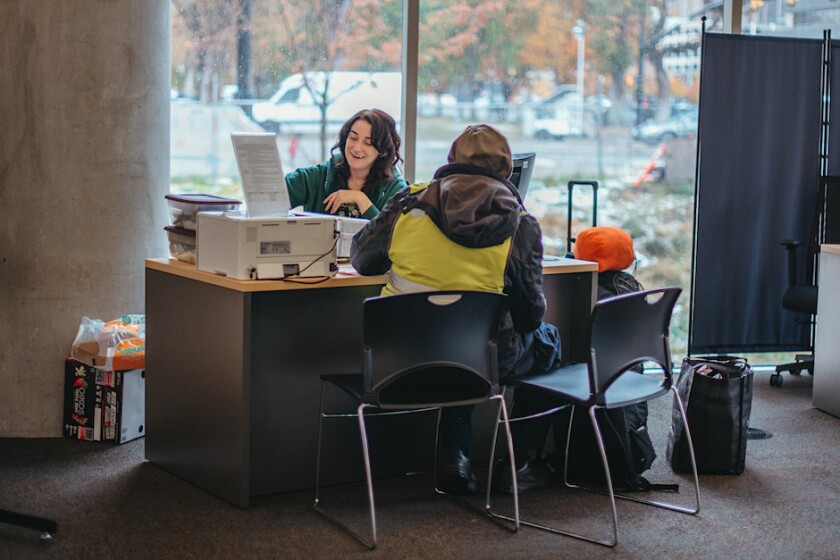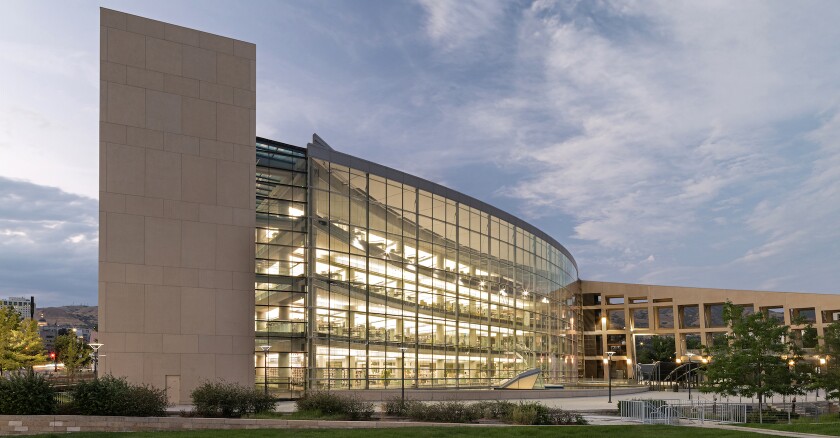In Brief:
- Unhoused persons often seek a break from the streets in public libraries.
- In response to the growth of this population, libraries are expanding the services they offer to them.
- The Salt Lake City Public Library has added two full-time social workers to its staff to help unhoused patrons chart a long-term path off the streets.
Public libraries are storehouses of knowledge, but they are also places of refuge. They offer relief from extreme heat, digital access for people who need it, help with school assignments and shelter in disasters. They can also function as safe spaces for unhoused people stressed out by street life, a role that many libraries across the country are working to embrace.
Earlier this year, dozens of library directors from around the U.S. met in Los Angeles for a CEO Roundtable hosted by the Urban Libraries Council (ULC) and the L.A. city and county libraries. Over three days, they discussed the unique role libraries can play in filling gaps in services for the unhoused and strategies that could improve library-based programs.
The Salt Lake City Public Library (SLCPL) was among the libraries highlighted in a report from the roundtable. The library has long worked with state and local agencies to help unhoused patrons access social services such as mental health counseling, homeless shelters or substance-abuse prevention programs.
All visitors of a library, says SLCPL's Director Noah Baskett, are welcomed as patrons of a "dignifying institution," regardless of their housing status or any other demographic trait.

(SLCPL)
A Wider Net
When Nicole Campolucci took the new job of head of social services, her first task was to assess how the services in place matched community needs. “The three areas that I identified as the most pressing needs within our library system were homelessness, substance abuse and mental illness,” Campolucci says.
The library had partnered with a local agency to connect patrons to food, shelter, counseling and other services for over a decade, but it was only funded to assist the unhoused. Campolucci cast a wider net, growing the library’s network of active partners tenfold. This gave her resources to help patrons with problems often associated with homelessness, even if they were currently housed.
In addition to her other duties, Campolucci worked one-on-one with unhoused individuals who found their way into the library. Last August, she was able to hire another full-time social worker whose only job is counseling homeless patrons and helping them connect with services provided by partner organizations.
Campolucci and her colleague engage with people who might not find their way to help through other channels due to shame or distrust. “If they’re in a place where they feel welcome and comfortable and they have a social worker to connect with, we can start to take steps to improve their situation,” she says.

(SLCPL)
Resources and Empathy
The presence of the social workers helps ensure that visitors find their way to resources the library offers those struggling with housing instability or other issues.
The main library building has a “Resource Corner” with desks for partner organizations like Mental Health America of Utah, Odyssey House (harm reduction services), The Road Home (supportive services for veterans) and the Department of Workforce Services to hold office hours. Printed information about shelters and places for food, clothing, substance abuse help and medical care can be found in the Resource Corner. “We don’t need to send them out to another building,” says Daniel Neville-Rehbehn, SLCPL’s director of customer experience. “That’s an important feature.”
Additionally, a peer support specialist leads a coffee and conversation group attended primarily by unhoused individuals, and a “housing survival” group meets monthly at the library. There, the newly housed talk about the ways that having a home is culturally different than living on the street and what it will take to maintain their housing.
The SLCPL’s social services department is authorized to provide ID vouchers that can be used to obtain a replacement ID at a driver’s license division.
If behavioral or medical problems arise, there’s an in-house safety team that includes EMTs. “That helps address capacity issues with our 911 dispatch if we’re able to handle more things ourselves,” says Neville-Rehbehn. “It’s been an active development over the past several years figuring out where we hand things off.”
These tools exist alongside more traditional library services — access to the Internet, help with job searches, or assistance applying for Medicaid or food stamps.
SLCPL's work to help the unhoused hasn't come without some amount of local controversy. Some community members have expressed complaints or concerns about homeless patrons, Neville-Rehben says. However, he says, “I’ve also heard some real gratitude from patrons that we offer these services, and the increased empathy they have from seeing folks in here getting support."

(Melissa Kelsey)
SLCPL’s work with the homeless is supported through the library’s general fund, boosted recently by an increase in the library tax rate. But Baskett wants to continue to grow the social services department. He’s hopeful that distribution of community development block grant funds from the Department of Housing and Urban Development will make this possible.
At a recent staff development day, some of the formerly homeless patrons they had helped shared their stories of recovery. All had relied on the library at their lowest points, whether to use a bathroom or a computer to search for treatment.
“They were expressing so much gratitude to the staff, first and foremost for being treated like human beings, which was so different than their experiences outside of our doors,” says Campolucci. “It was really moving."









